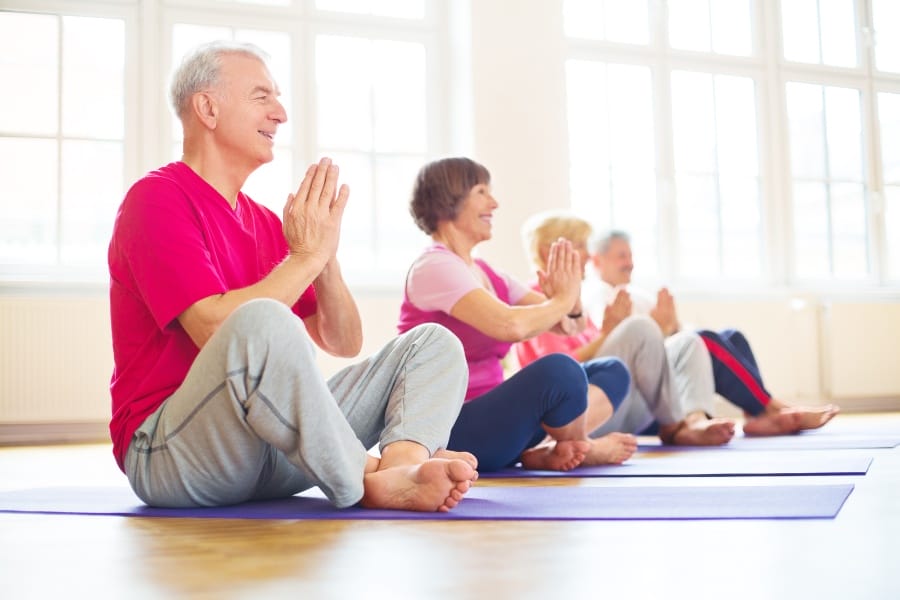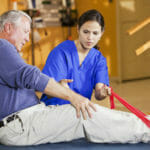As the years go by, we long to maintain our well-being for as long as possible. But healthy aging isn’t just about adding years to your life; it’s about adding life to your years.
The million-dollar question on every senior’s mind is: “How can I maintain my health and independence as I age?”
That is where we come in! This comprehensive guide will be your compass on the journey to vibrant aging. We want you to truly love living your life in your later years.
In the following sections, we’ll explore seven essential tips that lay a solid foundation of healthy aging. From keeping your body spry to nourishing your mind and soul, we’ll cover a wide variety of strategies to help you thrive in your golden years.
So, grab a cup of herbal tea, settle into your favorite armchair, and let’s embark on this enlightening voyage together.
Key Takeaways: Healthy Aging Tips
- Stay Active: Regular exercise maintains heart health, strengthens bones, boosts mood, and promotes independence.
- Eat Well: Follow a healthy diet rich in fruits, vegetables, whole grains, lean proteins, and healthy fats.
- Keep Your Mind Sharp: Engage in cognitive activities like learning new skills, solving puzzles, and staying socially active.
- Stay Socially Connected: Maintain relationships, volunteer, join clubs, and use technology to combat isolation.
- Prioritize Preventive Care: Schedule regular check-ups, screenings, and vaccinations to catch health issues early.
- Manage Stress: Practice mindfulness, meditation, and find healthy ways to cope with stress.
- Get Quality Sleep: Establish a consistent bedtime routine and create a sleep-friendly environment.
Tip 1: Stay Active – The Fountain of Youth is Exercise
IN THIS ARTICLE

Regular physical activity is the secret sauce that keeps your body young and vibrant.
Staying active is crucial for healthy aging. Regular physical activity helps maintain muscle strength, balance, flexibility, and brain health, reducing the risks associated with aging.
It’s not about running marathons (unless that’s your cup of tea); it’s about finding ways to move that bring joy and vitality to your life.
Here’s the skinny on why exercise is your best friend in the aging game:
• It keeps your heart ticking like a well-oiled machine
• Strengthens your bones, making them harder to crack than a tough nut
• Boosts your mood faster than you can say “endorphins”
• Helps you maintain your independence longer than a stubborn mule
Now, don’t go jumping into an Ironman competition just yet. Start small and build up gradually.
Maybe try:
- A daily constitutional around the neighborhood
- Joining a silver sneakers program at your local gym
- Taking up tai chi or yoga for both body and mind benefit
- Simple daily stretches
Remember, the best exercise is the one you’ll actually do. So, find something that tickles your fancy and stick to it like glue. Your future self will thank you for it!
Summary: Regular physical activity is the key to maintaining a youthful body and mind, offering benefits such as improved heart health, stronger bones, enhanced mood, and prolonged independence. The best approach is to start small with enjoyable activities like neighborhood walks, gym programs, or tai chi, gradually building up your routine to ensure consistency and long-term benefits.
Now let’s look at a couple of specific examples.
Aerobic and Muscle-Strengthening Exercises
Aerobic exercise is essential for cardiovascular health – even simple steps (pun intended) like walking have benefits.
Activities like walking, swimming, and dancing increase heart rate and improve lung function. Aiming for at least 150 minutes of moderate aerobic exercise per week helps keep the heart healthy.
Muscle-strengthening exercises are also important. Using weights or resistance bands can help maintain muscle mass and strength.
This can make everyday tasks easier and prevent injuries.
For example, lifting light weights or doing body-weight exercises like squats and push-ups can be effective.
Enhancing Balance and Flexibility
Balance and flexibility exercises help prevent falls and improve mobility. Activities like yoga and tai chi are excellent choices.
Yoga stretches muscles and improves flexibility, which can help reduce pain and stiffness. Tai chi, a form of martial arts, emphasizes slow, deliberate movements that enhance balance and coordination.
Even simple practices like standing on one foot or walking heel-to-toe can significantly improve balance over time. Incorporate these exercises into a daily routine to stay steady on your feet.
Do you suffer from arthritis?
Here are some activities to help you keep moving – even with arthritis.
Tip 2: Nourish Your Body – Eating Well for Longevity

Think of your body is like a classic car – it needs premium fuel to keep running smoothly.
As we age, our nutritional needs shift, and it’s time to pay attention to what’s on our plates.
What is a healthy diet?
A healthy diet should include a variety of fruits, vegetables, whole grains, nuts, and lean proteins. These foods are rich in vitamins and minerals that support overall health.
Vitamins like A, C, and E are important for maintaining immune function and skin health. Minerals such as calcium and magnesium support bone health. Lean proteins from sources like fish, chicken, and legumes provide the building blocks for muscle and tissue repair.
Consuming healthy fats from avocados, olive oil, and nuts can help improve heart health by reducing cholesterol levels. Whole grains provide important fiber, which aids in digestion and helps prevent heart disease and diabetes.
The Mediterranean diet has been making waves in the health world, and for good reason. It’s packed with:
• Heart-healthy olive oil
• Omega-3-rich fish
• Colorful fruits and veggies that’ll make your plate look like a painter’s palette
But don’t think you need to overhaul your entire diet overnight. Small changes can make a big difference.
Try swapping out that afternoon cookie for a handful of nuts, or adding an extra serving of veggies to your dinner plate.
Remember, moderation is key – a little bit of what you fancy does you good!
Hydration is another crucial piece of the puzzle.
As we age, our thirst signals can become as unreliable as a weatherman’s forecast. Keep a water bottle handy and sip throughout the day.
Summary: Eating a balanced diet rich in essential nutrients can help maintain good health and promote a long life. Key elements include incorporating necessary vitamins, reducing inflammation through plant-based foods, and limiting processed foods and sugars. The Mediterranean diet, rich in olive oil, omega-3 fish, and colorful produce, offers significant health benefits and can be adopted gradually through small, manageable changes. Staying hydrated is equally important, especially as we age, so keep water readily available and sip regularly throughout the day.
Tip 3: Keep Your Mind Sharp – Cognitive Wellness Matters

Your brain is like a muscle – use it or lose it.
Keeping your grey matter active is crucial for maintaining cognitive function and warding off the boogeyman of aging: cognitive decline.
Here are some brain-boosting activities to keep your mind as sharp as a tack:
• Learn a new language (Bonjour, anyone?)
• Take up a musical instrument
• Do crossword puzzles or Sudoku
• Join a book club (Socialize and stimulate your mind – two birds, one stone!)
Don’t forget about the mind-body connection.
What’s good for your body is often good for your brain too. Regular exercise increases blood flow to your brain, keeping it as perky as a morning coffee.
And speaking of coffee, a cup of joe might just give your brain a little boost – just don’t overdo it, or you’ll be bouncing off the walls!
That being said, let’s look at a few specific activities that can benefit cognitive health.
Activities for Cognitive Health
Physical activity is also important for brain health. Regular exercise can slow cognitive decline and improve memory. Aerobic exercises, such as dancing and walking, increase blood flow to the brain.
Strength-training exercises also benefit cognitive health. Activities requiring coordination can stimulate the brain and improve mental alertness.
Similarly, learning new skills or hobbies can also be beneficial in avoiding cognitive decline or memory loss.
Taking up a musical instrument, learning a new language, or even simple activities like knitting can keep the brain engaged. Consistent cognitive engagement is key to reducing the risk of dementia and maintaining mental agility as you age.
Click here for tips on how to reduce memory loss in seniors.
Summary: Keeping your brain active is crucial for maintaining cognitive function and preventing decline, which can be achieved through activities like learning a new language or solving puzzles. Physical exercise, including aerobic and strength-training activities, plays a vital role in brain health by increasing blood flow and improving mental alertness. Consistently engaging in new skills or hobbies is key to reducing the risk of dementia and maintaining mental agility as you age.
Tip 4: Connect and Engage – The Social Aspect of Healthy Aging

Humans are social creatures, and staying connected is as essential to our well-being as water is to a fish.
As we age, our social circles might naturally shrink, but that doesn’t mean we can’t expand them again!
Volunteering is a fantastic way to stay engaged and give back to your community.
It’s a win-win situation – you get to make new friends and feel purposeful, and someone else benefits from your wealth of experience.
Technology can be your best friend when it comes to staying connected.
Don’t let it intimidate you – embrace it like a long-lost friend.
Video calls with family, online community groups, or even social media can help you stay in touch with loved ones and make new connections.
Remember, quality trumps quantity when it comes to relationships. A few close friends can be worth their weight in gold. Nurture these relationships like you would a prized orchid, and they’ll bloom beautifully in your golden years.
Summary: Staying socially connected is crucial for mental well-being and preventing loneliness. Maintaining relationships and engaging in social activities can improve brain function and reduce the risk of cognitive decline. Research has shown that social isolation can lead to an increased risk of depression and dementia.
Tip 5: Prioritize Preventive Care – Staying Ahead of Health Issues
Think of preventive care as your body’s early warning system. Regular check-ups and screenings can catch potential issues before they become as stubborn as a mule.
Here’s a quick rundown of some essential screenings to keep on your radar:
• Annual physical exam (Your yearly tune-up)
• Colonoscopy (Not fun, but necessary)
• Mammogram or prostate exam (Gender-specific, but equally important)
• Bone density scan (Keep those bones as strong as an ox)
Don’t overlook vaccinations, either. The flu shot and shingles vaccine can be lifesavers for seniors. Think of them as your body’s bouncers, keeping the riffraff (aka viruses) at bay.
Don’t be shy about discussing your health concerns with your doctor.
They’ve heard it all before, and there’s no such thing as a silly question when it comes to your health. Be your own advocate – after all, nobody knows your body better than you do!
Summary: Regular preventive care, including annual check-ups, essential screenings (like colonoscopies, mammograms/prostate exams, and bone density scans), and vaccinations, acts as an early warning system to catch potential health issues before they become serious. Be proactive about your health by discussing any concerns with your doctor and advocating for yourself, as you are the expert on your own body.
Tip 6: Manage Stress and Prioritize Mental Health

Stress can age you faster than a week in the sun without sunscreen. Learning to manage stress is like finding the fountain of youth – it can keep you feeling younger and more vibrant.
Mindfulness and meditation aren’t just for yogis and Zen masters. They’re powerful tools that can help you navigate the choppy waters of life with more ease.
Stress management is essential for maintaining mental health and cognitive function. Chronic stress can harm brain cells and lead to conditions like depression and anxiety.
Start small – even five minutes of deep breathing or guided meditation can work wonders. Click here for some beneficial breathing techniques.
At the same time, you can acknowledge that it is okay to not be okay sometimes.
Mental health is just as important as physical health, and there’s no shame in seeking help if you’re feeling down in the dumps. Talking to a therapist can be as refreshing as a cool drink on a hot day.
Laughter truly is the best medicine. Seek out humor in your daily life – watch a funny movie, share jokes with friends, or just be silly sometimes.
After all, you’re only as old as you feel!
Summary: Effective stress management, through practices like mindfulness, meditation, and deep breathing, is crucial for maintaining mental health and cognitive function. Remember that it’s okay to seek professional help when needed, and don’t underestimate the power of laughter and humor in your daily life to combat stress and promote overall well-being.
Tip 7: Get Quality Sleep – The Often Overlooked Pillar of Health

As we age, our sleep patterns can become a bit unpredictable and less than consistent. But don’t worry, there are ways to improve your sleep quality.
First and foremost, the importance of sleep cannot be overstated. Sleep impacts our health, ability to retain information, and ability to function.
Create a bedtime routine that is consistent and prioritizes getting enough sleep. Maybe it’s a cup of chamomile tea, a good book, or some light stretching. Whatever works for you, just make it a consistent habit.
Your bedroom should be a sleep sanctuary. Keep it cool, dark, and quiet – like a bear’s cave, but more comfortable. Invest in a good mattress and pillows – your body will thank you in the morning.
If sleep is playing hard to get, don’t force it. Get up, do a quiet activity, and try again when you feel sleepy.
Reading a book (not your phone – due to blue light) is a fantastic and quiet activity to help prepare your body for sleep.
Summary: Sleep patterns often become irregular with age, but there are effective strategies to enhance sleep quality. Creating a consistent bedtime routine and optimizing your sleeping environment are key steps to improving your nightly rest and overall well-being.
Tip: Learn 10 tips for better sleep here.
Bonus Tip: Managing Health Risks

Managing health risks involves staying aware of potential medical issues and taking proactive steps to address them. This includes getting regular health checkups, understanding family health history, and making informed lifestyle choices.
Regular Health Screenings and Checkups
Regular health check-ups and screenings are essential for early detection and prevention of diseases. Annual checkups with a primary care doctor can spot issues like high blood pressure and high cholesterol levels before they escalate.
Screenings specific to age and gender, like mammograms for breast cancer or bone density tests for osteoporosis, are also crucial. According to the National Institute on Aging, regular checkups can help manage chronic conditions like diabetes and arthritis more effectively. Consistent monitoring and timely intervention can significantly improve long-term health outcomes.
Knowing and Acting on Family Health History
If there is a history of heart disease, cancer, or diabetes in the family, it’s important to discuss this with a doctor. They may recommend earlier or more frequent screenings.
Pro Tip: Family health history offers clues on genetic predispositions that could affect one’s risk of developing certain conditions.
Take the Steps Towards Healthy Aging
There you have it – your roadmap to healthy aging. Remember, it’s not about turning back the clock, but about making the most of every tick and tock.
Embrace these seven tips, but don’t forget to enjoy the journey. After all, life is not a dress rehearsal!
Could You Benefit from In-Home Nursing Care?
If you suffer from chronic pain or have a strict medication regimen, hiring a private nurse can provide immense peace of mind.
Private duty nurses are skilled at offering high-end care for a variety of health conditions, along with providing companionship. Needless to say, having an in-home nurse in your corner would certainly assist in your goal to age in a healthy fashion.
If this sounds appealing to you or a loved one, learn more about NurseRegistry by clicking below.
People Also Ask About Healthy Aging
These common questions address mental health, diet, exercise, social engagement, sleep, and health screenings as vital aspects of healthy aging.
What are the most effective strategies for maintaining mental health in old age?
Engaging in activities like reading, puzzles, and learning new skills helps keep the mind sharp. Even relaxed, leisure activities are beneficial. Social connections are also crucial, whether through family, friends, or community groups. Regular exercise and a balanced diet further support mental well-being.
What dietary habits contribute to longevity and vitality?
Eating a variety of nutritious foods promotes good health. Focus on healthy foods, such as plant-based foods, lean proteins, and healthy fats. Limit processed and packaged foods. Drinking plenty of water and controlling portion sizes can also play a significant role.
How can physical activity impact the aging process?
Regular exercise improves strength, flexibility, and balance. Activities like walking, gardening, and lifting weights help maintain physical health. Even light exercises can benefit overall wellbeing by reducing the risk of chronic diseases and enhancing mobility.
What role does social engagement play in healthy aging?
Staying socially active can reduce feelings of isolation and depression. Activities such as joining clubs, volunteering, and staying in touch with loved ones contribute to emotional health. Social engagement promotes a sense of purpose and community.
How important is sleep for older adults’ health?
Adequate sleep is essential for physical and mental health. Aiming for 7-9 hours of sleep each night helps with memory, mood, and overall functioning. Good sleep hygiene, such as a regular sleep schedule and a comfortable sleeping environment, is important.
What preventative health screenings are crucial as one gets older?
Regular check-ups and screenings can detect health issues early. Important screenings include blood pressure checks, cholesterol tests, cancer screenings, and vision and hearing tests. This is helpful in avoiding cardiovascular disease, lung disease, cancer, and more.






